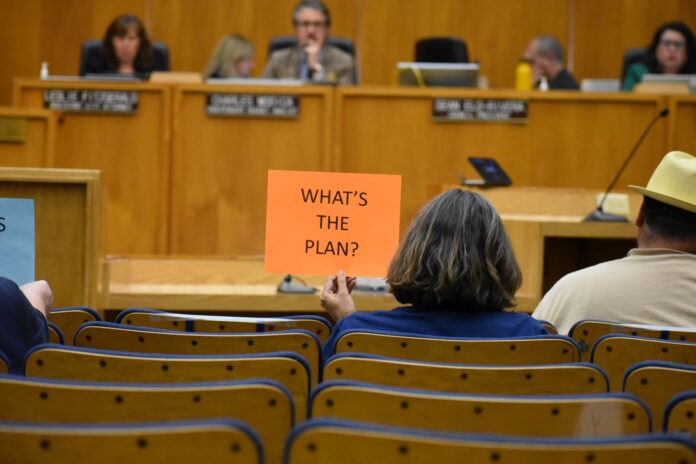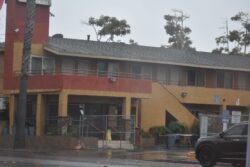
By Macy Meinhardt, Voice & Viewpoint Staff Writer
Amid hours of public testimony, most of which consisted of concerned residents pleading for basic humanitarian support, the San Diego Board of Supervisors voted 4-0 Tuesday to extend hotel vouchers for impacted flood victims and allocate funding to provide displaced victims three meals a day, instead of one.
Allocated from the county’s general fund reserves, $6.6 million will go towards lodging extensions and $3 million for food services till May 11th. This adds to the prior $10 million allocation board members approved on Jan. 30th just days after the storm. However, the main thing that was made clear by victims at the March 12th board meeting is this; the first allocation was not enough, and the execution lacked dignity; getting constituents to trust that their county leaders will take care of them for the second round is looking like a pipedream.
“We have children, they are not getting their meals in, they are hardly eating anything because there is no stovetop in the Ramada, and when we do ask for the basic things; toiletries, towels, they treat us like we are a burden and that we have no dignity,” said Yama St. resident, Cristal Ramirez.
Ramirez, like many other San Diegans flood victims, is currently staying at the Ramada Inn, which is one of the appointed shelter locations within the County’s temporary lodging program launched February 12. Funding for these hotel stays, along with the administrative costs, and meal services made up the majority of the initial $10 million allocation the county originally agreed to.
“We can’t spend public tax dollars here without a vote, but it is not my intention for you to come here and have to beg for necessities,” said Supervisor Monica Montgomery-Steppe; in regards to the new projected total of recovery assistance spent by the county being $16.6 million.

Beyond this providing only the “bare minimum” of one hot meal a day, residents complain that the counties subcontracted emergency housing provider, Equus, has exacerbated the trauma brought on by the flood and its aftermath—saying that their taxpayer money is going to a company that has treated them with “disrespect” and “zero dignity”.
Impact by the numbers:
Since January 22, data San Diego County has collected is the following:
- The storms impacted 2,400 households, affecting a total of 7, 750 people
- 1,225 of those households are displaced .
- 91% of households have indicated they have no flood insurance
- 47% impacted households include children
- 54% of impacted households have pets
- 31% of households include seniors
- 35% of households include individuals with disabilities or access and functional needs.
According to the county’s contract for Equus services, the San Diego County contracts Equus to identify, negotiate, and obtain service agreements and lodging providers for rooms to be made available on an as needed basis to displaced or evacuated during regional, and sub-regional emergencies. Unless staying with family or friends, Equus has been contracted to provide housing for the 1,225 households displaced by the storms.
Yet, based on testimony provided by the over 61 people who showed up in person to speak at the board meeting, communication between Equus officials and community members has been poor; residents say that Equus doesn’t call them back to confirm their voucher extensions, causing perpetual anxiety on where they will live day to day.
“I had to call them fifteen times on a Sunday to get approved for my extension…they (Equus) are playing with our minds,” said Southcrest resident Moises Godinez.
“We are already going through a extremely difficult stressful situation, trying to figure things out what is our next step, how we are going to survive, and Equus and has just been making us anxious as to where we are going to be staying, having to check out and not knowing if we are going to be moving rooms and having to pack everything up just for them to tell us we are going to be staying in the same room,” said Ramirez.
“Equus is a horrible company, they don’t have their stuff together, we keep getting phone calls saying that we are going to get extensions but then we don’t have the extensions at the hotels,” said Lisa Sheffield, a third generation Veteran.
In addition to these complaints, residents also pressed County leaders to instead fund local nonprofits to coordinate emergency housing–saying groups such as the YMCA and Harvey Family Foundation have consistently had boots on the ground and built relationships with the community, as opposed to Equus.
“You need to give the money to the YMCA, the Harvey family foundation; they treat us right, they give us stress free comfort to know where we are going to stay,” said Michael Rios.
“The county has a duty to provide oversight, and when it is not working out, we expect you to do better,” said Erin Tsurumoto Grassi, Associate Director at Alliance San Diego.
After testimony wrapped, Supervisor Chair Nora Vargas confirmed that they have put Equus on notice about the challenges the community has brought forward, telling residents that the board as a whole “takes this very seriously.”
Meanwhile at the meeting, board members called up Equus Representative, Mark Douglass, to give an explanation to the concerns residents had expressed at the meeting.
“Madam chair, supervisors, I want to apologize. The weight of all of the pain I heard today, I sit with that and I own it. To the community behind me I hear you and I am sorry,” said Douglass.
Additionally Douglass noted: “My staff stands behind me today, they have worked with what they have, and that wasn’t good enough, but we will make it right.”
“I stand with county partners, I stand with the community, I will do whatever we can; and if the decision is to partner with more community based organizations, I fully support that.”
After hearing testimony for Douglass, the board made a motion for staff to look into incorporating community based organizations, such as the YMCA, and Harvey Family Foundation into their emergency contracting.
Voice & Viewpoint will continue to keep the community updated whenever a more long term plan comes to fruition for flood displaced victims.


